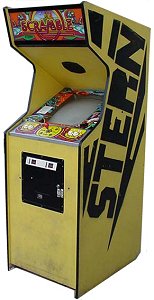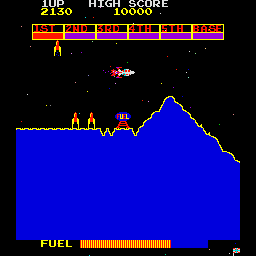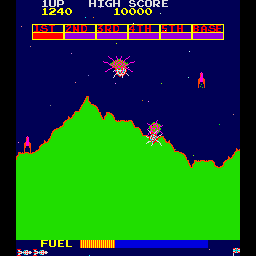
 The Game: Once again, you’re apparently the only space pilot willing to take on this dangerous mission – though there’s probably a reason for that. You’re storming a heavily-armed installation which has loads of missiles and other defenses. And there’s one thing you don’t have a load of – fuel. If your gas needle lands on the big E, you’re going to your doom in a big rush. For some reason whose physics I can’t even begin to explain, bombing fuel depots in the enemy base will replenish your tank. Good luck! (Stern [under license from Konami], 1981)
The Game: Once again, you’re apparently the only space pilot willing to take on this dangerous mission – though there’s probably a reason for that. You’re storming a heavily-armed installation which has loads of missiles and other defenses. And there’s one thing you don’t have a load of – fuel. If your gas needle lands on the big E, you’re going to your doom in a big rush. For some reason whose physics I can’t even begin to explain, bombing fuel depots in the enemy base will replenish your tank. Good luck! (Stern [under license from Konami], 1981)
Memories: A fun little Defender-style game, Scramble is a real challenge, especially the pesky, persistent problem of fuel shortage. But it proved to have a pesky, persistent problem of its own in the courtroom. Scramble was the basis of a major landmark copyright case in the history of computer-based works.


Faced with an unauthorized manufacturer that was brazenly turning out Scramble machines, artwork, circuitry and all, without changing a thing or even attempting to get a license, Konami and Stern fought an uphill battle to change the law – and they won. The precedent set by the Scramble case was huge: computer code itself was now a copyrightable work. Whether that code powered an arcade game, a home computer spreadsheet or some arcane business application was immaterial.
Scramble is also an early example of a “tourist” game. I define a tourist game as one where you’re not only trying to kick ass, but see what is promised to be a wide variety of sights along the way. Donkey Kong, Fantasy and Jungle King are good examples of tourist games. Each level is different – unlike, say, Pac-Man. In Scramble, your progress is measured along the top of the screen in terms of how close you are to “Base.”


Scramble was also a much-beloved coin-op in the eyes of arcade owners everywhere for a simple reason. With its almost generic configuration, the printed circuit boards of a Scramble cabinet could be swapped out for the circuit boards of nearly any other machine that required no more than a joystick and two buttons, and voìla, new game. There are numerous examples of Scramble cabinets housing Pac-Man and Frogger games.
Very late in the Atari 2600 era, Konami released its own cartridge version of Scramble – its second title after the Atari version of Pooyan – but coming as close as it did to the Crash, this version didn’t set any video game sales records.
 But Konami outlived Atari and later released Scramble (along with the similar Super Cobra, which the packaging claims to be Scramble‘s sequel) as part of any number of retro arcade compilations.
But Konami outlived Atari and later released Scramble (along with the similar Super Cobra, which the packaging claims to be Scramble‘s sequel) as part of any number of retro arcade compilations.
